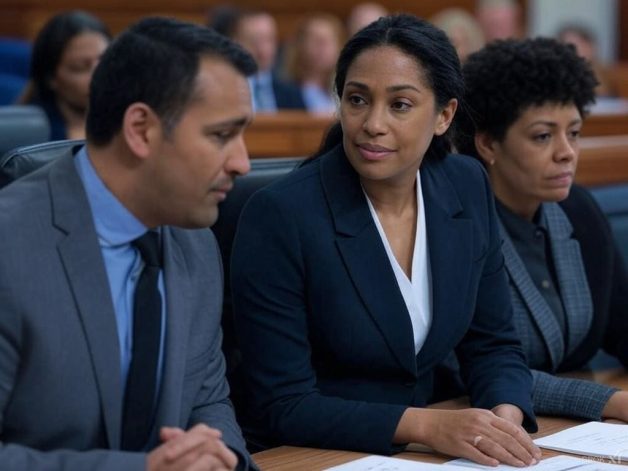When facing the complexities of family law matters, particularly those involving child custody y divorce, the expertise of a family court lawyer becomes invaluable. These legal professionals specialize in guiding clients through the intricate web of family law, ensuring that their rights are protected and the best interests of any children involved are prioritized. The role of a family court lawyer extends far beyond mere representation in court; they serve as advisors, negotiators, and advocates for their clients during what is often one of the most challenging periods of their lives.
The process of navigating custody and divorce proceedings can be emotionally taxing and legally complex. A skilled family court lawyer possesses a deep understanding of state-specific family laws, court procedures, and the nuances of negotiating favorable outcomes for their clients. They are equipped to handle a wide range of issues that may arise during these proceedings, from property division and spousal support to child custody arrangements and visitation schedules.
One of the primary responsibilities of a family court lawyer in custody cases is to help establish a custody agreement that serves the best interests of the child while protecting the rights of their client. This often involves negotiating with the other parent’s attorney to reach a mutually acceptable arrangement. If an agreement cannot be reached through negotiation, the lawyer will prepare to present their client’s case before a family court judge, arguing for a custody arrangement that aligns with their client’s wishes and the child’s well-being.
In divorce cases, a family court lawyer’s role encompasses a broader spectrum of legal issues. They must address the division of marital assets, determine spousal support if applicable, and ensure that their client’s financial interests are protected throughout the divorce process. This may involve working with financial experts to value assets, uncovering hidden assets, and developing strategies to secure a fair settlement for their client.
El concepto de custodia legal is a crucial aspect of many family court cases involving children. Legal custody refers to the right and responsibility to make important decisions about a child’s upbringing, including choices regarding education, healthcare, and religious instruction. A family court lawyer must help their client understand the implications of various custody arrangements and advocate for an outcome that allows their client to maintain a meaningful role in their child’s life.
Custodia física, on the other hand, pertains to where the child will reside and which parent will be responsible for the day-to-day care of the child. Family court lawyers often find themselves negotiating complex visitation schedules that accommodate the needs of both parents and the child. These schedules must consider factors such as work commitments, school schedules, and the child’s extracurricular activities to create a workable arrangement for all parties involved.
In cases where parents are unable to agree on custody matters, a family court lawyer may recommend alternative dispute resolution methods such as mediación. Mediation can be an effective way to resolve custody disputes without the need for a lengthy and costly court battle. A skilled family court lawyer can guide their client through the mediation process, ensuring that their interests are represented while working towards a collaborative solution.
When mediation is not successful or appropriate, a family court lawyer must be prepared to litigate custody issues in court. This involves gathering evidence, preparing witnesses, and crafting compelling arguments to present before a judge. The lawyer must demonstrate why their proposed custody arrangement is in the best interests of the child, often relying on factors such as the child’s relationship with each parent, the stability of each home environment, and each parent’s ability to meet the child’s needs.
In divorce proceedings, a family court lawyer must navigate the complexities of división de la propiedad. This process involves identifying and valuing all marital assets, including real estate, retirement accounts, investments, and personal property. The lawyer must then work to ensure that their client receives a fair share of these assets in accordance with state law. In community property states, this typically means an equal division of marital assets, while in equitable distribution states, the division must be fair but not necessarily equal.
Another critical aspect of divorce proceedings that a family court lawyer must address is the determination of spousal support, also known as alimony. The lawyer must assess whether their client is entitled to receive spousal support or, conversely, may be obligated to pay it. Factors considered in spousal support determinations include the length of the marriage, each spouse’s earning capacity, and the standard of living established during the marriage. A skilled family court lawyer will work to negotiate a spousal support arrangement that is fair and sustainable for their client.
Child support is another crucial element in many family court cases involving children. A family court lawyer must help their client understand the state’s child support guidelines and calculate the appropriate amount of support based on factors such as each parent’s income, the number of children, and the custody arrangement. The lawyer may also need to address special circumstances that could affect child support, such as extraordinary medical expenses or educational costs.
In cases involving violencia doméstica or abuse allegations, a family court lawyer plays a critical role in protecting their client and any children involved. This may include obtaining protective orders, advocating for supervised visitation, or arguing for sole custody based on safety concerns. The lawyer must be prepared to present evidence of abuse and articulate how it impacts the best interests of the child in custody determinations.
Family court lawyers must also be adept at handling modifications to existing custody and support orders. As circumstances change over time, it may become necessary to adjust custody arrangements, visitation schedules, or support payments. A lawyer can help their client petition the court for modifications based on substantial changes in circumstances, such as relocation, changes in income, or shifts in the child’s needs.
The role of a family court lawyer extends beyond the courtroom and negotiation table. They often serve as a source of emotional support and guidance for their clients during a turbulent time. A compassionate lawyer understands the stress and anxiety that accompany family law proceedings and can provide reassurance and clarity throughout the process. They may also connect clients with other professionals, such as therapists or financial advisors, to help them cope with the various challenges of divorce and custody disputes.
In cases involving high-net-worth individuals, family court lawyers must be particularly skilled in handling complex financial matters. This may include valuing business interests, addressing tax implications of property division, and protecting assets through prenuptial or postnuptial agreements. These cases often require collaboration with forensic accountants and other financial experts to ensure that all assets are properly identified and valued.
International custody disputes present unique challenges for family court lawyers. These cases may involve issues of jurisdiction, enforcement of foreign custody orders, and application of international treaties such as the Hague Convention on the Civil Aspects of International Child Abduction. A lawyer handling such cases must have a thorough understanding of both domestic and international family law principles.
Adoption is another area where family court lawyers may provide invaluable assistance. Whether it’s a stepparent adoption, private adoption, or adoption through the foster care system, these cases require careful navigation of legal requirements and procedures. A family court lawyer can help prospective parents understand their rights and obligations, complete necessary paperwork, and represent them in court proceedings to finalize the adoption.
In cases involving paternity issues, a family court lawyer may need to help establish or challenge paternity. This can have significant implications for custody, visitation, and child support obligations. The lawyer may need to arrange for DNA testing, file the appropriate legal documents, and represent their client in paternity hearings.
Family court lawyers must also be prepared to handle cases involving grandparents’ rights. While the primary focus in custody cases is typically on the parents, grandparents may have legal standing to seek visitation or custody in certain circumstances. A skilled lawyer can help grandparents understand their rights and pursue legal action if necessary to maintain a relationship with their grandchildren.
The emergence of same-sex marriage and its legal recognition has introduced new considerations in derecho de familia. Family court lawyers must be knowledgeable about the evolving legal landscape surrounding same-sex divorce, custody issues for same-sex parents, and adoption rights for LGBTQ+ individuals and couples. These cases may present unique challenges and require innovative legal strategies to ensure fair outcomes for all parties involved.
In cases involving abuso de sustancias or mental health issues, family court lawyers play a crucial role in protecting the well-being of children while also advocating for parents who may be struggling. This might involve recommending treatment programs, arranging for supervised visitation, or working with mental health professionals to develop parenting plans that address these challenges while still promoting healthy parent-child relationships.
Relocation cases present another complex area of derecho de familia that requires skilled legal representation. When a custodial parent wishes to move with the child to a different state or country, it can significantly impact the non-custodial parent’s visitation rights. A family court lawyer must help their client navigate the legal requirements for relocation, which often involve demonstrating that the move is in the child’s best interests and proposing a revised visitation schedule that maintains the child’s relationship with the non-relocating parent.
Family court lawyers must also be prepared to handle cases involving child emancipation. In some situations, minors may seek to become legally independent from their parents before reaching the age of majority. These cases require a delicate balance of advocating for the minor’s interests while ensuring that all legal requirements for emancipation are met.
The rise of collaborative law in family court matters has introduced a new approach to resolving disputes. In collaborative law, both parties and their attorneys agree to work together to reach a settlement without going to court. Family court lawyers who practice collaborative law must be skilled in negotiation and problem-solving, working to find creative solutions that meet the needs of all parties involved.
Prenuptial y postnuptial agreements are another important aspect of family law that requires the expertise of a skilled lawyer. These agreements can help protect assets and define financial responsibilities in the event of a divorce. A family court lawyer must be adept at drafting these agreements to ensure they are legally binding and fair to both parties.
In cases involving military families, family court lawyers must be familiar with the unique laws and regulations that apply to service members. This includes understanding the Servicemembers Civil Relief Act, which provides certain protections to active-duty military personnel in civil proceedings, including divorce and custody cases.
The increasing use of assisted reproductive technology has introduced new legal challenges in family law. Family court lawyers may need to handle cases involving surrogacy agreements, sperm or egg donation, and the legal rights of intended parents versus biological parents. These cases often require a thorough understanding of rapidly evolving laws and ethical considerations.
As technology continues to impact family dynamics, family court lawyers must also be prepared to address issues related to digital assets in divorce proceedings. This may include valuing and dividing cryptocurrency holdings, addressing ownership of social media accounts, and determining how to handle shared digital content such as photos and videos.
The role of a family court lawyer in navigating custody and divorce proceedings is multifaceted and demanding. It requires not only a deep understanding of family law but also skills in negotiation, litigation, and client counseling. As family structures and societal norms continue to evolve, family court lawyers must stay abreast of legal developments and be prepared to adapt their strategies to best serve their clients’ needs. Whether guiding clients through amicable divorces or fighting fierce custody battles, family court lawyers play a crucial role in shaping the future of families and protecting the best interests of children caught in the midst of legal disputes.
Website citations:
- https://www.findlaw.com/family/child-custody/how-child-custody-decisions-are-made.html
- https://www.araglegal.com/legal-now/learning-center/topics/family-and-relationships/child-custody-in-divorce
- https://www.womenslaw.org/laws/hi/custody/all
- https://www.courts.state.hi.us/self-help/divorce/how_to_proceed
- https://www.superlawyers.com/resources/family-law/
- https://cordellcordell.com/resources/glossary/
- https://www.nesl.edu/blog/detail/everything-you-need-to-know-about-becoming-a-family-law-attorney
- https://www.guestandgray.com/what-to-expect-during-a-child-custody-hearing.html
- https://www.divorcenet.com/resources/hawaii-child-custody-laws.html
- https://brickelllegal.com/family-law-terms/









